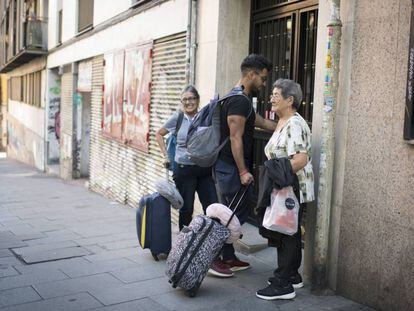Spanish businesses seek to lure British tourists with tax-free shopping
Thanks to Brexit, UK nationals can claim a VAT refund on purchases made in the EU, a change that the industry hopes to take advantage of

/cloudfront-eu-central-1.images.arcpublishing.com/prisa/XHWKYNDJYNEQTJHRFX2PEV6USQ.aspx)
The United Kingdom’s exit from the European Union has led to many challenges, but there is also some good news. Thanks to Brexit, UK nationals can now claim a value-added tax (VAT) refund on purchases made during trips to the EU – in other words, they have a permanent discount at any store they go to. This is already having an impact on sales in Spain. According to preliminary data from Global Blue, a company specializing in tax refunds, between January and the end of September, the average expenditure per British tourist in Spain was €1,337, much higher than the average for all nationalities in 2019 (€357). This figure is also higher than the average expenditure of €837 by Chinese visitors to Spain, whose annual average spend is greater than other nationalities.
In this way, the UK’s exit from the EU has become an unprecedented opportunity for Spain, given that UK nationals can claim a VAT refund on their purchases. Before the coronavirus pandemic, British tourists made around 70 million trips to the EU every year, and around 18 million chose Spain as their destination. From this number, the six million who visited the Canary Islands have to be deducted, as it is not possible to claim back VAT on purchases in the Spanish archipelago.
We have to take advantage of this moment to change the inertiaJavier Fernández Andrino, director of international clients and luxury at El Corte Inglés
Annual spending on leisure trips to Europe is €40 billion, according to the UK’s Office for National Statistics, and the continent is fighting for a piece of the pie. The battle is focusing on raising awareness. “The destination that puts this idea [of tax-free shopping] in the market first will be taking a huge step,” says a senior executive from the sector.
A campaign to explain tax-free shopping is key, given that many UK nationals are unaware they have this option. “According to stores, only 10% of Britons who have made purchases in Spain have benefited from the refund. It’s a very low percentage, given that for the rest of the nationalities, it is always over 50%,” says Luis Llorca, the managing director of Global Blue Spain.
Both the private and the public sectors must address this, argues Llora. “Authorities have not made the necessary effort to make the possibility of shopping refunds known,” he says.
“We have to promote it, raise awareness and make it stronger,” adds a senior executive from the sector, in reference to tax-free shopping. “If it’s done well, UK nationals will be the nationality that makes the most tax-free purchases in Spain.”
With respect to the private sector, many Spanish stores are unaware of the change, some are collecting information on how it works, while others are already trying to benefit from it.
That’s the case for Spanish department store El Corte Inglés, which launched a campaign last summer with Iberia airlines to promote tax-free shopping to British tourists. The initiative worked well, according to sources from the company, and the goal now is to bring even more visibility to the concept. “We are going to promote it in the World Travel Market at the beginning of November in London,” says Javier Fernández Andrino, the director of international clients and luxury at El Corte Inglés. “We are going to tell the market and it is something that public institutions and big cities should do as well. We have to take advantage of this moment to change the inertia.”
Permanent discount
Tax-free shopping is the equivalent of having a permanent discount at any store in Spain, but one that does not hurt businesses. The percentage of the discount varies depending on the amount of the purchase, but it can be applied to all types of products, from clothes and bags to electronics and jewelry.
Of all tax-free shopping by UK nationals in Spain last summer, 55% was in jewelry and watches and 40% on clothes and accessories, according to Global Blue. Most of this spending was in Málaga (27%), the Balearic Islands (26%), Barcelona (21%) and Madrid (18%).
Figures show that British visitors who claimed back VAT spent more in France than anywhere else: between January and September, the average expenditure per tourist was €2,337, which is €1,000 more than in Spain, according to Blue Global.
How to reclaim VAT
To claim a refund of VAT on purchases made in Spain, you need to fill in a tax-free form in the shops where you buy your purchases. This document lists all the items you want to claim a VAT refund on.
This form needs to be validated at customs within three months of the purchase date. Some stores, including El Corte Inglés, offer an electronic VAT refund procedure (DIVA). These forms can be validated directly at automatic terminals installed in Spain’s main ports and airports. If there is no DIVA terminal, the document needs to be validated by a Spanish customs officer.
As for paper forms, these must be validated by customs officials before you leave the EU. If your form is not validated, the goods will be considered as not having left the EU, and therefore, not eligible for a tax refund.
If you are departing to another country in the EU, you will not be able to reclaim VAT in Spain. You will have to do this in the last customs point before leaving the EU.

/cloudfront-eu-central-1.images.arcpublishing.com/prisa/6BFFYEOIGLRBBF4LH4YFRHEDSQ.JPG)










































